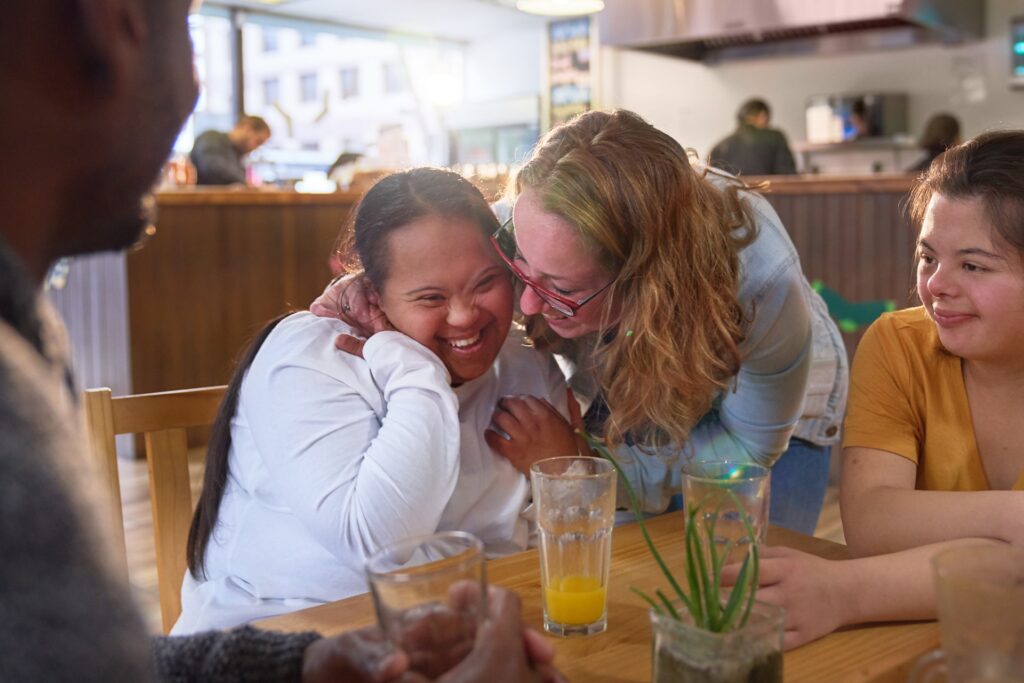Be a Trusted Adult For Young People in Your Life
Research from the Search Institute, the Institute for Education Sciences and other organizations has demonstrated that trusted adults provide an important benefit to the well-being of children. Trusted adults can be family members, grandparents, teachers or social workers and this kind of relationship can have a positive impact on physical, mental and social outcomes for children.


Find local support
Connect with a NAMI chapter near you
Select your state to find a local NAMI affiliate. The page will redirect to the affiliate's page when a state is selected.

In need of help or support?
If you are struggling with your mental health, there are a variety of ways to connect with NAMI. Get immediate support by calling, texting or emailing.
Who is a Trusted Adult?
- Someone who is not a parent or caregiver but is part of the child’s safe natural network through family and other institutions.
- Chosen by the child. Among the child’s safe natural network of adults, a child chooses to seek out a deeper bond with those they identify as trusted adults.
- Shares some similar values as the child’s family and community network
- Often has a special ability to inspire children to make positive choices in their lives.
- Often has a special ability to inspire children to make positive choices in their lives.
- Can spark positive outcomes for children who might not have other healthy adults in their lives.

Trusted Adults Provide Extra Emotional Support.
They offer opportunities for prevention and intervention around issues that impact youth mental health.

How to be a “Trusted Adult”
Be Someone Who “Talks, Not Tells”
Youth identify trusted adults by their willingness to listen and engage, rather than lecture and give orders. Have open conversations about mental health, social media, bullying, etc. and share your own experiences.
Ask Questions. Offer Support and Encouragement.
Youth are often unsure of their own talents and interests, and how to navigate social relationships. Trusted adults help build their confidence in their ability to share themselves with others.
Children go through developmental phases that include changes in emotions, thoughts and behavior. Most of the time, these are typical periods in development, such as the “terrible twos” when children usually have trouble separating and experience “melt-downs,” which is a stark contrast to one year olds who are not as troubled by exploring their world.
When teenagers give you the cold shoulder, shut down or “snap” at you, they may be trying, as teens should, to become their own individuals. During this time, they’re developing their personal identities and breaking away from the family. Again, this is typical behavior. But when this type of situation persists or begins causing difficulty in their daily life, it may be a symptom of a mental health condition. This is the time to intervene.
Be a Role Model
Youth often choose “trusted adults” who have characteristics, and/or work and interests that the youth admires and would like to develop for themselves.
A Trusted Adult Is a Support, Not the Solution
Whether you’re a family member or professional working with youth, being approached by a young person can be daunting when they want to share their feelings and experiences. Remember, your main role is to embrace the fact that the child sees you as a supportive, empathetic, and compassionate person. This bond is a doorway for you to encourage the child to get additional support if needed, and if not needed, then just to listen and offer support.
Keep in mind that children are not often listened to or taken seriously by adults. Your act of listening with a caring ear has a powerful impact. Know that you are making a difference, even by “just” listening.
Things to Remember

Refer Out
Encourage youth to accept resources. You can listen, but the child and/or their family might need additional resources, such as counseling or other social services. Their trust in you could make a difference in encouraging them to reach out or accept resources being offered to them.
Set Limits or “Boundaries”
Being there for a child does not mean instant access all of the time. Rather, being there simply involves letting the child know when you can support them, then acting consistently and being true to your word. The goal is to provide consistent access to support, with boundaries.
Transparency
Remind the youth that confidentiality is not guaranteed if you feel they need additional support.
Tips for Boundary Setting
Respectful Communication

Acknowledge power dynamics. Becoming a trusted adult can encourage youth to open up to you, which is great. However, as an adult, you hold a position with specific responsibility to care for their well-being. This role creates a natural power differential. While their trust in you may lead them to start to connect with you as a peer, you should make sure to maintain some expectations around how they address and communicate with you.
Clarify and reinforce expectations about respectful communication to prevent misunderstandings. These expectations vary from person to person, so clarifying them will help avoid feeling frustrated or causing the young person to feel hurt.
Youth Contacting You Outside of Work Hours or the Work Site:
Make sure you comply with the policies of your organization, and inform youth about what those policies are.
Within these organizational policies, you may need to set additional expectations for how and when you are able to connect with youth.
- Let youth know the specific hours you are available and when you are unavailable.
- Be consistent about youth responding during the time frames you established, and gently reminding them of the expectations if they break them.
- Being available “on demand” is not what makes you a trusted adult. Your consistency is what helps youth maintain their view of you as a trusted adult.
Appropriate Support

Once youth trust you, they may seek you out for a range of support, which is wonderful! Always keep in mind that listening to youth, and appropriately sharing from your own perspective and lived experience, is very supportive.
However, be prepared to redirect youth to professionals and/or their parents for support as appropriate. Your goal is to ensure that youth get the support they need, despite their tendency to seek all support from you due to the relationship they have built with you.
The Power of Being There
Know that you are making a difference, even by “just” listening. Here are a few general impacts and outcomes for youth who have at least one trusted adult in their childhoods:
- Less risk-taking behaviors
- Higher self-esteem
- More motivation to succeed in school and other activities
- Positive employment outcomes later in life
- Improved physical and mental health
Related resources

Cultivating trusted adult bonds in the school environment
Learn from The Institute of Education Sciences

Insights on the role of relationships in children’s lives
Learn from The Search Institute